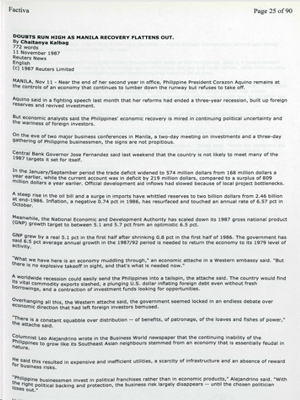DOUBTS RUN HIGH AS MANILA RECOVERY FLATTENS OUT
[Reuters]
Published date: 11th Nov 1987
11 November 1987
Reuters News
English
(c) 1987 Reuters Limited
MANILA, Nov 11 – Near the end of her second year in office, Philippine President Corazon Aquino remains at the controls of an economy that continues to lumber down the runway but refuses to take off.
Aquino said in a fighting speech last month that her reforms had ended a three-year recession, built up foreign reserves and revived investment.
But economic analysts said the Philippines’ economic recovery is mired in continuing political uncertainty and the wariness of foreign investors.
On the eve of two major business conferences In Manila, a two-day meeting on investments and a three-day gathering of Philippine businessmen, the signs are not propitious.
Central Bank Governor Jose Fernandez said last weekend that the country is not likely to meet many of the 1987 targets it set for itself.
In the January/September period the trade deficit widened to 574 million dollars from 168 million dollars a year earlier, while the current account was in deficit by 219 million dollars, compared to a surplus of 809 million dollars a year earlier. Official development aid inflows had slowed because of local project bottlenecks.
A steep rise in the oil bill and a surge in imports have whittled reserves to two billion dollars from 2.46 billion at end-1986. Inflation, a negative 0.74 pct in 1986, has resurfaced and touched an annual rate of 6.57 pct in October.
Meanwhile, the National Economic and Development Authority has scaled down its 1987 gross national product (GNP) growth target to between 5.1 and 5.7 pct from an optimistic 6.5 pct.
GNP grew by a real 5.1 pct in the first half after shrinking 0.8 pct in the first half of 1986. The government has said 6.5 pct average annual growth in the 1987/92 period is needed to return the economy to its 1979 level of activity.
“What we have here is an economy muddling through,” an economic attache in a Western embassy said, “But there is no explosive takeoff in sight, and that’s what is needed now.”
A worldwide recession could easily send the Philippines Into a tailspin, the attache said. The country would find its vital commodity exports slashed, a plunging U.S. dollar inflating foreign debt even without fresh borrowings, and a contraction of investment funds looking for opportunities.
Overhanging all this, the Western attache said, the government seemed locked in an endless debate over economic direction that had left foreign investors bemused.
“There is a constant squabble over distribution — of benefits, of patronage, of the loaves and fishes of power,” the attache said.
Columnist Leo Alejandrino wrote In the Business World newspaper that the continuing inability of the Philippines to grow like its Southeast Asian neighbours stemmed from an economy that is essentially feudal in nature.
He said this resulted in expensive and inefficient utilities, a scarcity of infrastructure and an absence of reward for business risks.
“Philippine businessmen invest in political franchises rather than in economic products,” Alejandrino said. “With the right political backing and protection, the business risk largely disappears — until the chosen politician loses out.”
Unlike Thailand, where a series of coups had not disturbed basic economic policy and internal government debate did not intrude into business decisions, no one was sure what was in store in the Philippines, the Western diplomat said.
“A successful military coup — and that is still very possible — might unleash tremendous turmoil and sweep away all that Aquino has set in place,” he said.
Jesus Estanislao, president of the state-owned Development Bank of the Philippines, said in a recent speech that recent growth was due mainly to favourable external factors, but tax and tariff reform, debt restructuring and the rehabilitation of government financial institutions had taken a lot of time.
“A second concern is the Tower of Babel that seems to overshadow the entire Philippine landscape, ” Estanislao said. “Everybody in the country seems to be shouting his head off …. Soon, a sense of drift was widely perceived, and it became public knowledge that the country’s economic policy makers still had to put their act together.”
In contrast with the prevailing pessimism, Robert Sears, president of Merrill Lynch Philippines Inc, this week’s investment conference reflected a continuing positive outlook by foreign investors.
“In spite of recent political disturbances, investments still flowed into the country,” he said.
“Merrill Lynch has been and continues to be bullish about the Philippines,” Sears said. “While we recognise the transitional problems confronting the country, we also appreciate the opportunities for improvement and growth.”






